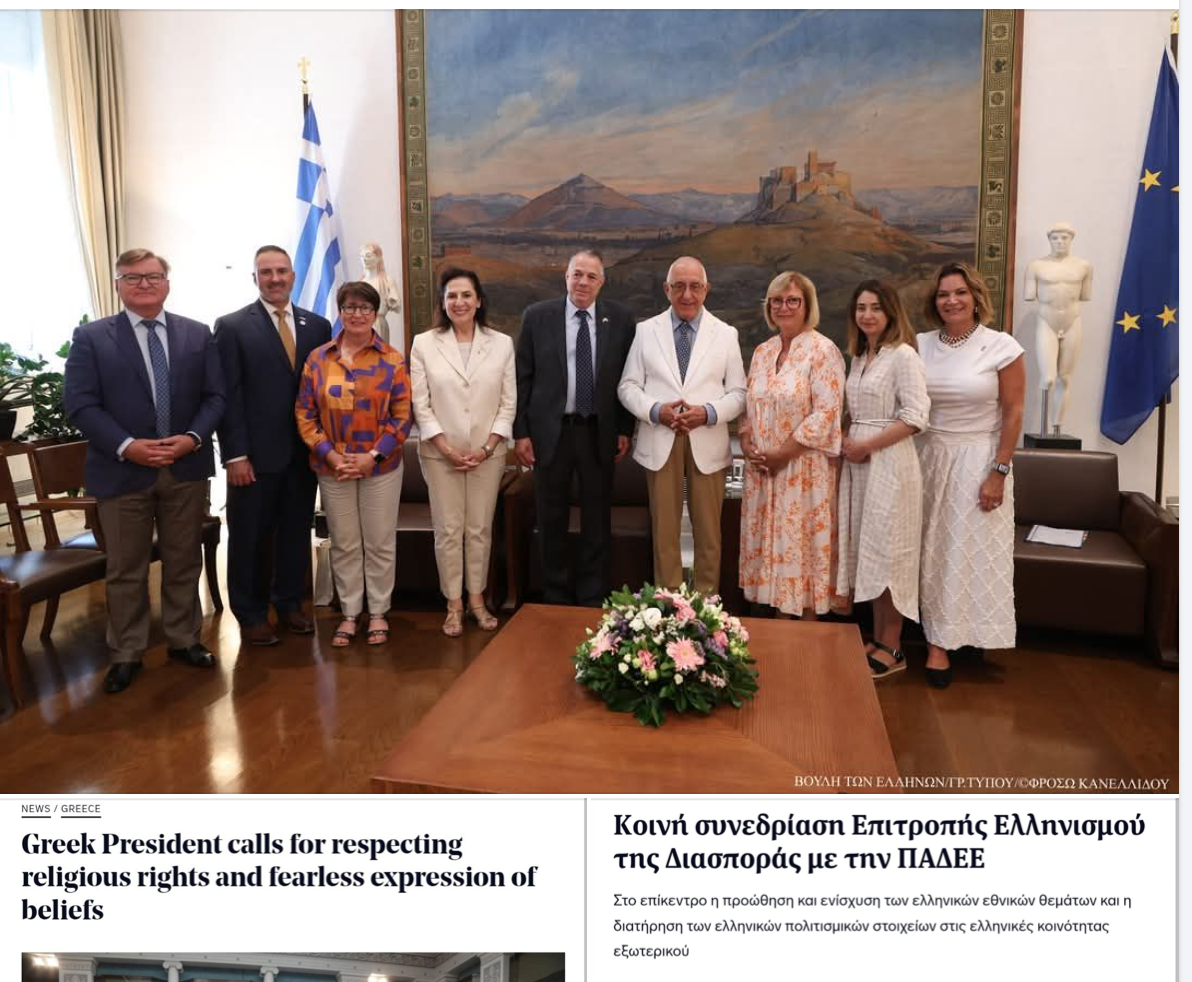GREECE’S RELATIONSHIP WITH THE WORLD HELLENIC INTERPARLIAMENTARY ASSOCIATION
When Greece tried in the mid-1990s to connect and to network with its various diasporic communities around the globe, it came up with the concept of #SAE (World Council of Hellenes Abroad), a body which at its inception, included representatives from the entire organisational spectrum of the various Greek diasporic communities all over the planet, secular and religious. SAE has ceased to be active for quite a few years now, but according to the Greek constitution, it remains the voice of expatriate and Greek heritage people abroad. As for its scope and responsibilities, these are to be defined by the laws of the Greek state.

Along with the creation of SAE in the mid-1990s, the Greek state also created a number of "thematic" SAE networks. Namely, Youth, Scientists, Women, Business people, European Local Government Councillors and the World Hellenic Inter – Parliamentary Asoociation (WHIA-PADDE=Pagosmia Diakoinovouleftiki Enosi Ellinismou) Networks.
Out of all the structures created back in the middle 1990s, the only one that is currently "alive" is WHIA (https://padeewhia.org/)!!!
A few days ago (July 20 to 25), in #Athens, #Greece, the World Hellenic Inter-Parliamentary Association (#PADEE-#WHIA) convened its 15th General Assembly, bringing together elected legislators of Hellenic descent from across the globe, most of them from state legislatures and others from federal parliaments.
The membership of PADEE-WHIA includes full and associate members.
Full members are persons of Greek origin who are current elected members of legislatures in non-Greek speaking countries. These members have the right to participate and vote at the PADEE-WHIA General Assembly held every two years in Athens, Greece. Any current serving legislator elected to any Legislature in the world is eligible for membership.
The 90+ PADEE-WHIA's members come from countries such as the United States, Albania, Australia, Canada, France, Hungary, Sweden, Ukraine. The aim of WHIA is the strengthening of the bonds among Greece, Cyprus, and the countries where its members come from.
The General Assembly, which convenes every two years in Athens, also included this year, the election of a new Board of Governors for the 2025–2027 term.
How serious, how important, how productive though, is the relationship of Greece with PADEE-WHIA and vice versa?
1. The website of PADEE is dated and not all that "rich" in content.
2. The limited number of media releases that came out of Athens for the 15th General Assembly, is a one-way Greco-centric traffic, that is, they talk about the meetings the Greek heritage MPs had, with officials (Greek government, ambassadors and others), in order to be briefed about various national, educational, cultural and other issues of importance to Greece.
3. Greek heritage legislators at the General Assembly also passed resolutions on the Greek and Pontic Genocide, on the human and religious rights of Christians in Turkey, Egypt (Monastery of St Cathryn at Mount Sinai) and Syria.
4. Furthermore, based on the news stories published in various Greek Australian media outlets, PADEE members addressed the issue of empowering women of the Hellenic diaspora in leadership (how?), whereas Greek MPs stated that they should seek the opinion of PADEE-WHIA and its members during the policymaking process and on matters affecting Greeks abroad.
However…
Given that Greek heritage MPs are citizens of countries other than Greece, who serve in state and federal Parliaments abroad, representing electorates that have nothing to do with the various Greek diasporic communities and their specific issues…
Given that they represent different political parties and ideologies, in countries other than Greece, where they are elected to serve the interests of the citizens of these countries, which are their countries…
Given that they are elected as individual citizens and party members of another country and not as Greek heritage MPs…
Given that PADEE members do not have an organic and close relationship, or an overall philosophy, about the issues faced by the wider and diverse Greek heritage communities of their own countries…
Given that the existence of PADEE-WHIA is not widely known, or visible, to the various Greek diasporic communities around the world…
Considering the controversy surrounding the election of this year's new board (the 49 attendees did not constitute a quorum) who wished straight away to change the governing rules of the organisation…
We need to, we have to ask a question that relates to the usefulness, the impact and the possible longevity of the organisations.
After almost 29 years of existence and expenses…
How serious, how important, how productive, is the relationship of Greece with PADEE-WHIA and vice versa? What is the real influence and impact of PADEE-WHIA, if any, both in Greece and in other Parliaments around the world?
Is there a need for a major review?
Kostas Karamarkos
#photo credit: Members of the new PADEE/WHIA board, together with the speaker of the Parliament of Greece (Nikitas Kaklamanis)/WHIA facebook wall #opinion #politics #Greekdiasporas #policy
